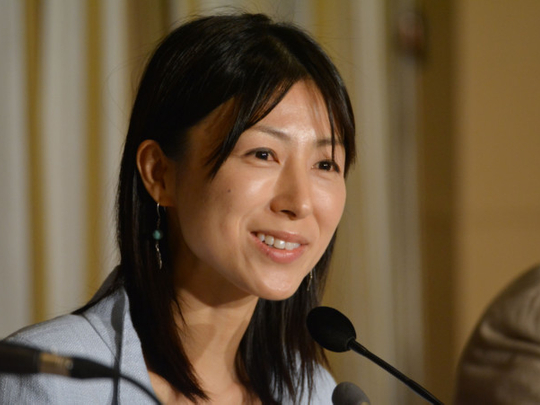
Japanese newspapers splashed front-page photos on Tuesday of a male Tokyo assemblyman bowing deeply to a woman colleague after admitting that he had heckled her with a sexist remark last week.
The uproar over the rude comments aimed at Ayaka Shiomura by several male lawmakers reflects both greater awareness of women’s issues and the pervasiveness of traditional chauvinist attitudes in business and political circles.
The latter poses a major challenge to Prime Minister Shinzo Abe’s goal of greater advancement for Japan’s well-educated but underemployed women, a mainstay in his arsenal of strategies for reviving the economy.
“I must admit that it’s a very difficult environment for women to work,” the 35-year-old Shiomura said at a news conference Tuesday. “Everything is run by the male standard, and naturally, that’s the kind of environment that caused the problem.”
Shiomura’s complaints about the heckling, through Facebook and Twitter, triggered a vehement public reaction and a petition drive demanding the hecklers be punished. “I really hope that the latest incident will provide an incentive for a change so that the same problem will never be repeated,” she said.
Assemblyman Akihiro Suzuki, 51, came forward to apologise Monday, so far the only heckler to do so. He later told reporters that he didn’t mean to insult her during her presentation on issues including maternity support and infertility for both sexes. But he persisted in echoing the comment he had made, saying he “really hoped she could marry soon, bearing in mind this ongoing trend where women are delaying marriage and having fewer children”.
As its workforce ages and shrinks, Japan needs women to help fill labour shortages and drive economic growth. Abe has made greater female participation one of his top priorities to lift the economy out of two decades of doldrums, promising to boost the number of places available for childcare. In a growth strategy announced Tuesday, he included a call to increase the number of women in the workforce by 530,000 within one year.
The call was part of a renewed push to empower women.
Abe launched an official blog called “SHINE! — Toward a Japan where all women can shine”. He said his blog is designed to provide a home to collect ideas from around the country to help women succeed, and said the government will back all women, whether pursuing careers or staying at home.
He also met business leaders and the two female Cabinet members at a panel promoting women’s representation in management-level positions, telling them that “measures to promote further performance by women, who are the biggest potential power, is the core of our growth strategy”.
Finally, he apologised to the leader of Shiomura’s political party for the trouble caused by Suzuki, who resigned from Abe’s ruling Liberal Democratic Party because of the incident.
Despite Abe’s support for greater gender equality, overt discrimination persists in hiring, promotion and pay — as well as in prevailing social attitudes and management styles.
Given the arduous commutes in big cities such as Tokyo, the long working hours and limited availability of affordable child care, most women stop working for at least a few years after they have children. When they return to work, they often get part-time, lower-paying jobs, because Japan’s inflexible, largely one-way career paths are less tolerant of career change.
Little help coming from their husbands in child-rearing and domestic work also keeps mothers from getting full-time jobs.
In the broader workforce, women earn an average of only about ¥110,000 (Dh3,963) a month. Growing numbers of never-married or divorced women, and half of all children of single mothers, live in poverty.
Given those realities, the population is declining as Japanese women increasingly opt out of marriage and motherhood.
Japan can ill afford that lost economic potential, said Goldman Sachs economist Kathy Matsui, who coined the term “womenomics” in arguing for a better deal for Japan’s working women. “The government, businesses and society all have to reform in order to resolve this problem,” she said in a recent speech.
More than half of all Japanese women attend college — almost on a par with men — but women are paid only 70 per cent of men’s wages for equal work, according to government data. Japan ranks 105th in the Geneva-based World Economic Forum’s Global Gender Gap Report, which measures economic equality and political participation. Iceland was No 1, and America 23.
Abe has proposed requiring that a third of all senior management in government agencies be women and has pressured the private sector to promote more women, including to board positions. Women make up only 3.9 per cent of board members of listed Japanese companies, versus 12 per cent in the US and 18 per cent in France, according to the Organization for Economic Cooperation and Development. Japan has never had a woman head of state.
Shiomura, the assemblywoman who was heckled, said that while she was glad Abe had set such goals for women, she was doubtful about its success given the prevailing male-oriented business and political culture.
“If you just look at the Tokyo metropolitan assembly, the environment is not one that would accommodate women’s advancement,” she said. “The reality is just not up to that level yet. Under the present circumstances, I doubt Abe’s ‘womenomics’ can be achieved.”










